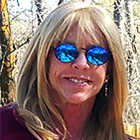Shows, rodeos, and the 'Smithsonian of the West'
Cody, Wyoming
Cody, Wyoming, is known as the “Eastern Gateway to Yellowstone Country.” But this authentic Old West town makes a great destination in itself, especially in summer, when each evening brings a selection of dinner/music shows, a shootout, and a rodeo. Don’t miss the five incredible museums that make up the “Smithsonian of the West.” My favorite stop: the final resting place of the real “Jeremiah Johnson.”

When “Buffalo Bill” Cody helped found the town that bears his name, the year was 1895. Cody felt the beauty of the area and its proximity to Yellowstone National Park made it a perfect spot for a town. I like to make my first stop at the locals’ favorite, Wayne’s Boot Shop. Since 1959 when Wayne Lundvall bought the business, this family-owned shop has dressed Cody in the finest cowboy boots, hats, and buckles. Properly attired, mosey over to the street outside the Irma Hotel around 5:30 p.m. Funny thing, a gunfight always seems to break out there around 6 p.m. (except Sundays). Bad guys vanquished, head inside to the Silver Saddle Saloon for a cold Buffalo Bill Beer. Note the original cherry wood bar, a gift to Buffalo Bill from Queen Victoria of England. The historic Irma Hotel, built in 1902 and named after Buffalo Bill’s youngest daughter, is open for tours, overnight stays, and dining, including their year-round Cowboy Music Show.

If your heart’s set on the rodeo, choose Dan Miller’s Cowboy Music Revue, located in the Buffalo Bill Center of the West’s new dining and entertainment pavilion. Your ticket includes a 5:30 p.m. dinner, followed by the 6:30 to 7:30 p.m. show so you can make the Cody Nite Rodeo, which begins at 8 p.m. (buy rodeo tickets online or at retailers all over town). The July 1 through 4 Cody Stampede includes parades and the huge Professional Rodeo Cowboys Association event, where some 800 contestants vie for a purse over $400,000. Downtown—and also timed to let you attend the rodeo—the Cody Cattle Co. is an ultra-casual live country western music show and chuckwagon dinner buffet where adults and kids sit at picnic tables. Don’t want the show? Try the local family-owned Bubba’s Bar-B-Que for the best in Western slow-smoked meats. Perhaps the best show (but no dinner) is the Wild West Spectacular, which runs during July in the Cody Theatre. Dancers, actors, and singers introduce you to Annie Oakley, Wild Bill Hickock, and other legends of the West. Action, romance, humor, perils, fights, toe tappin', hoots, and hollers are all part of the fun.
I saved Cody’s best for last. The Buffalo Bill Center of the West comprises five museums that radiate like spokes on a wheel from a central restaurant and focus on firearms, Plains Indians, natural history, Western art, and Buffalo Bill himself. Admission is good for two days, which I needed—see photos for more on this amazing place! We finished our visit in Old Trail Town, just west of Cody, a rare collection of authentic structures, including original cabins used by Old West outlaws Butch Cassidy and the Sundance Kid and a Wyoming saloon frequented by Cassidy's "Hole-in-the-Wall Gang." At the end of the street I was thrilled to finally see the grave of mountain man John “liver eating” Johnston, portrayed as Jeremiah Johnson by Robert Redford in the classic film. The true story of how he was moved from his original burial site beside a Los Angeles freeway to Cody is the subject of a rollicking book from a time I well remember.
Are you driving to Yellowstone from Cody? The Buffalo Bill Dam and Sleeping Giant Zipline are both on the way; plus, you can ride horses, dine, and sleep at the historic Bill Cody Ranch. Another good choice just east of the park is the Elephant Head Lodge. Opened by Buffalo Bill Cody’s niece in 1910, its log structures have been modernized, yet retain their original charm, while the restaurant dishes out legendary cinnamon rolls, steak dinners, and sack lunches for your day.

Share your favorite destination in the AOPA Hangar: Places to fly, things to do, where to eat!


















